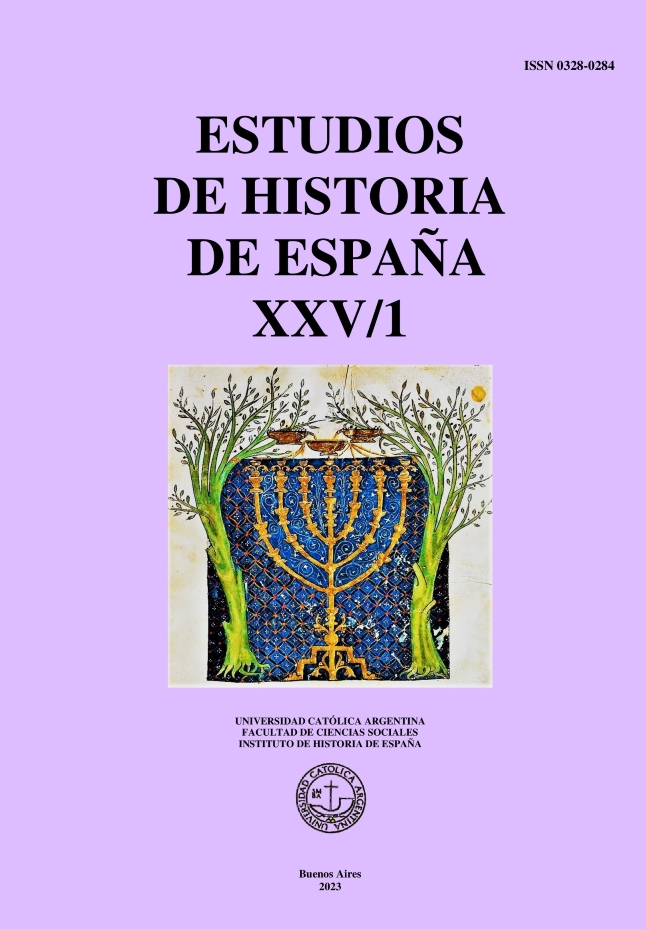The family in the Libro de Apolonio
DOI:
https://doi.org/10.46553/EHE.25.1.2023.p1-12Keywords:
Libro de Apolonio, family, king, private, publicAbstract
The Libro de Apolonio, a Castilian poem from the first half of the 13th century, makes it possible to analyze the norm of the family, both in relation to marriage, filiation and kinship ties, as well as in terms of the same domestic space shared by kings, their families and their subjects. The description of the Antioquia and Pentapolis courts leads to highlighting the importance of family relations as a measure of personal and political behavior, through the theme of incest and identity between private and public behaviors, especially in the figure of the Kings. The matrimonial problem focuses on the hero Apolonio, in principle, and then on his daughter Tarsiana in the second part of the story, and is based on the Christian ethical character of the central family conception in the poem.
Downloads
References
BROWNLEE, Marina Scordilis, “Writing and Scripture in the Libro de Apolonio: The Conflation of Hagiography and Romance”, Hispanic Review, 51, 2, 1983, 159-174.
BRUNDAGE, James A., Law, Sex and Christian Society in Medieval Europe, Chicago, University of Chicago Press, 1987.
CUESTA TORRE, María Luzdivina, “Uso del poder y amor paternal en el Libro de Apolonio”, en Lucía Megías, José Manuel ed., Actas del VI Congreso Internacional de la Asociación Hispánica de Literatura Medieval (Alcalá de Henares, 12-16 de septiembre de 1995), vol. 1, Alcalá de Henares, Universidad de Alcalá, 1997, 551-560.
DESING, Matthew V., “‘De pan y de tresoro’: Sacrament in the Libro de Apolonio”, La Corónica, 40, 2, 2012, 93-120.
DEYERMOND, Alan, “Motivos folklóricos y técnica estructural en el Libro de Apolonio”, Filología, 13, 1968-69, 121-149.
DEYERMOND, Alan, “Emoción y ética en el Libro de Apolonio”, Vox Romanica, 48, 1989, 153-164.
KANTOROWICZ, Ernst, Los dos cuerpos del rey. Un estudio de teología política medieval, Madrid, Alianza Editorial, 1985.
LACARRA, María Jesús, “Amor, música y melancolía en el Libro de Apolonio”, en Beltrán, Vicente ed., Actas del Congreso de la Asociación Hispánica de Literatura Medieval, Barcelona, PPU, 1988, 369-379.
LORING GARCÍA, Ma Isabel, “Sistemas de parentesco y estructuras familiares en la Edad Media”, en de la Iglesia Duarte, José Ignacio coord., La familia en la Edad Media. XI Semana de Estudios Medievales, Logroño, Instituto de Estudios Riojanos, 2001, 13-38.
MAIER, John R., “The Libro de Apolonio and the Imposition of Culture”, en Paolini, Gilbert ed., La Chispa ‘87: Selected Proceedings, New Orleans, Tulane University, 1987, 169-176.
MARTÍN, José-Luis, “El proceso de institucionalización del modelo matrimonial cristiano”, en de la Iglesia Duarte, José Ignacio coord., La familia en la Edad Media. XI Semana de Estudios Medievales, Logroño, Instituto de Estudios Riojanos, 2001, 151-178.
PERRY, Ben Edwin, The Ancient Romances. A Literary-Historical Account of Their Origins, Berkeley and Los Angeles, University of California Press, 1962.
SEGURA GRAIÑO, Cristina, “Las mujeres en la organización familiar”, en de la Iglesia Duarte, José Ignacio coord., La familia en la Edad Media. XI Semana de Estudios Medievales, Logroño, Instituto de Estudios Riojanos, 2001, 209-220.
ZUBILLAGA, Carina, Poesía narrativa clerical en su contexto manuscrito. Estudio y edición del Ms. Esc. K-III-4 (“Libro de Apolonio”, “Vida de Santa María Egipciaca”, “Libro de los tres reyes de Oriente”), Buenos Aires, SECRIT, 2014.
Downloads
Published
How to Cite
Issue
Section
License
Copyright (c) 2023 Estudios de Historia de España

This work is licensed under a Creative Commons Attribution-NonCommercial-ShareAlike 4.0 International License.


































 Estudios de Historia de España
Estudios de Historia de España